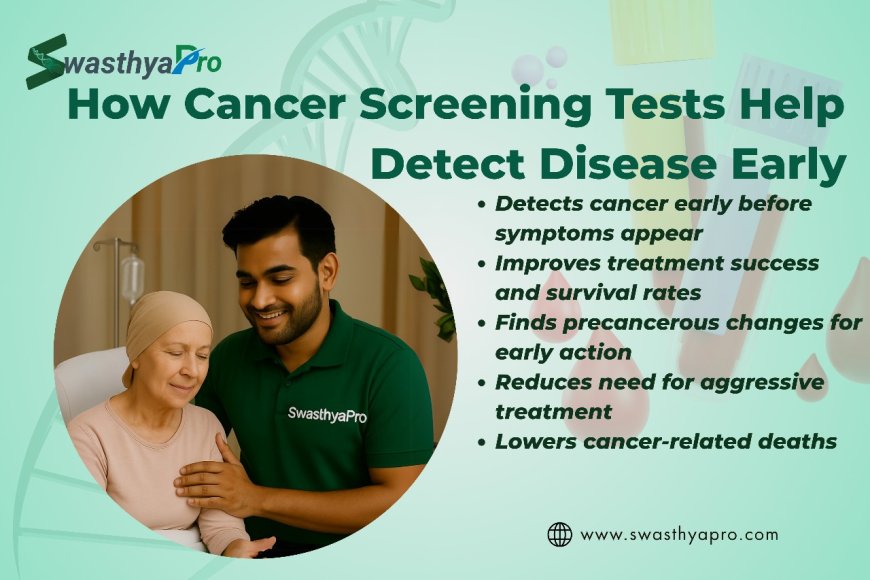Top 7 Types of Cancer Screening Tests You Should Know About

In the battle against cancer, the most powerful weapon is early detection. A cancer screening test is designed to catch warning signs before symptoms appear giving doctors and patients a crucial head start. Whether youre in your 20s or over 50, understanding the types of cancer screening tests available can be the difference between life and loss. In this article, we break down the top 7 most essential cancer screening tests everyone should know about.
1. Mammogram (For Breast Cancer)
One of the most well-known cancer screening tests, the mammogram uses low-dose X-rays to detect abnormalities in breast tissue. This test can identify lumps or masses even before they can be felt physically.
-
Recommended for: Women aged 40 and above (or earlier if high risk).
-
Frequency: Every 1 to 2 years, depending on personal and family history.
Regular mammograms as a cancer screening test can reduce breast cancer death rates by up to 30%.
2. Pap Smear & HPV Test (For Cervical Cancer)
A cancer screening test vital for women, the Pap smear detects abnormal cell changes in the cervix that could lead to cervical cancer. The HPV test, often conducted alongside it, checks for high-risk types of the human papillomavirus a major cause of cervical cancer.
-
Recommended for: Women aged 21 to 65.
-
Frequency: Pap smear every 3 years, or every 5 years with HPV test.
Together, these cancer screening tests have significantly lowered cervical cancer rates worldwide.
3. Colonoscopy (For Colorectal Cancer)
A colonoscopy is a more in-depth cancer screening test that uses a long, flexible tube with a camera to examine the colon and rectum for polyps or cancerous growths. If polyps are found, they can be removed during the procedure.
-
Recommended for: Adults aged 45 and above.
-
Frequency: Every 10 years if results are normal.
Other related cancer screening tests include stool-based tests (FIT or FOBT), but colonoscopy remains the gold standard.
4. Low-Dose CT Scan (For Lung Cancer)
This specialized cancer screening test is used for detecting early signs of lung cancer in high-risk individuals particularly smokers or former heavy smokers.
-
Recommended for: Adults aged 50 to 80 with a smoking history.
-
Frequency: Annually, for those who qualify.
Lung cancer is often diagnosed late, so this cancer screening test can play a crucial role in saving lives.
5. PSA Test (For Prostate Cancer)
The PSA (Prostate-Specific Antigen) blood test measures levels of a protein produced by the prostate. High levels may indicate inflammation, enlargement, or prostate cancer.
-
Recommended for: Men aged 50+, or earlier if there's family history.
-
Frequency: As advised by doctor based on risk factors.
While controversial due to risks of overdiagnosis, this cancer screening test can still be valuable with proper medical guidance.
6. Oral Cancer Screening
An often overlooked cancer screening test, this involves a visual and physical exam of the mouth, tongue, gums, and throat. Its quick and non-invasive and can detect early signs of oral cancer caused by tobacco, alcohol, or HPV.
-
Recommended for: Individuals 20+ who smoke, chew tobacco, or drink heavily.
-
Frequency: Annually during dental visits.
With oral cancers on the rise, especially in India, this cancer screening test is essential for prevention.
7. Skin Cancer Check (Dermatoscopy)
A dermatoscopy is a visual cancer screening test done by dermatologists to examine moles or skin lesions for signs of melanoma or other skin cancers.
-
Recommended for: Anyone with many moles, fair skin, or sun exposure.
-
Frequency: Annually or as recommended by a dermatologist.
This simple visual cancer screening test can catch potentially deadly melanomas early.
Why Knowing Your Options Matters
Each cancer screening test serves a specific purpose. Some require imaging, some are blood-based, and some involve physical exams. But all share one goal detect cancer before it spreads. Knowing which tests apply to your age, gender, and risk level can empower you to take proactive steps for your health.
Early diagnosis through a cancer screening test often leads to less aggressive treatment, fewer complications, and a better quality of life. In contrast, undiagnosed cancer can spread silently and prove far more difficult to treat.
Where to Begin
If youre unsure which cancer screening test is right for you, consult a healthcare provider. Services like Swasthyapro now offer customized screening packages, doorstep sample collection, and doctor consultations making cancer prevention more accessible than ever.
Final Words
A cancer screening test might seem small, but it can have life-altering power. Whether it's a simple blood draw or a full colonoscopy, each test is a chance a chance to catch cancer before it grows, spreads, or becomes dangerous.
































